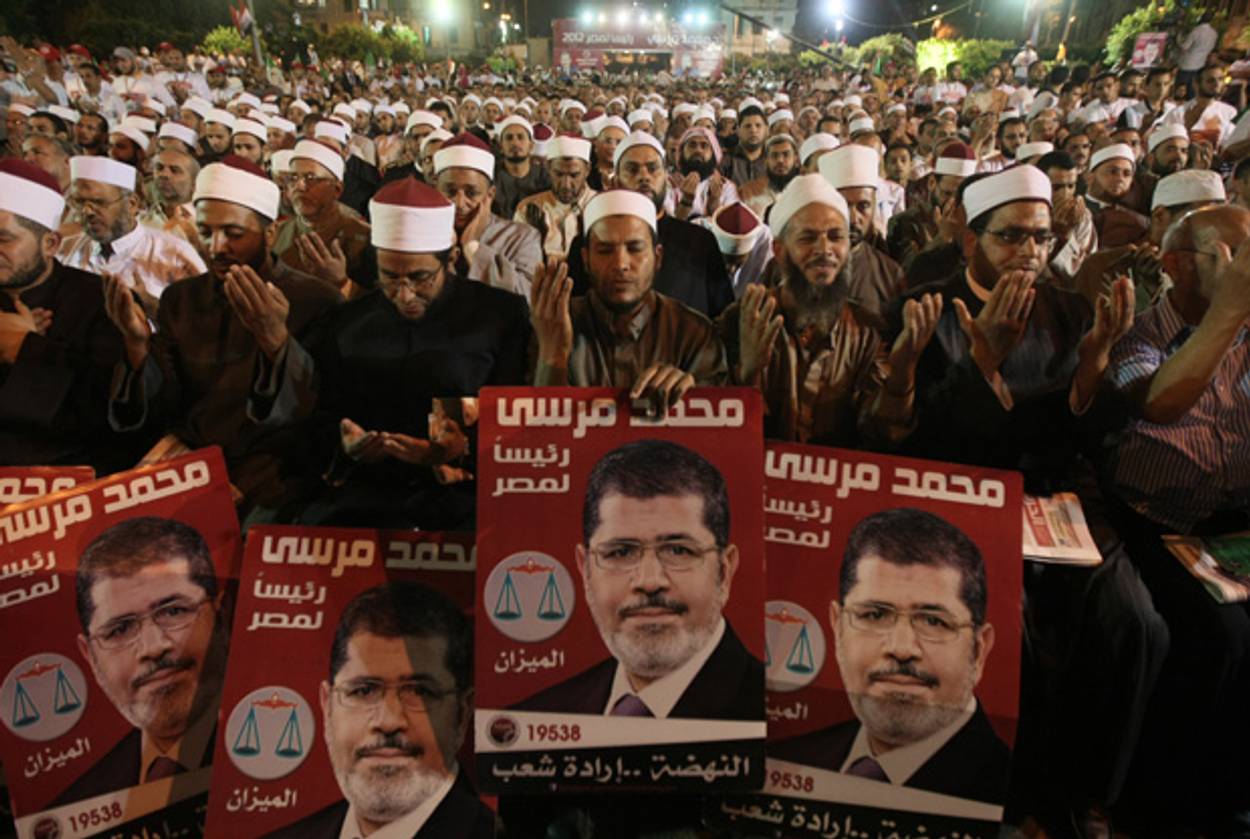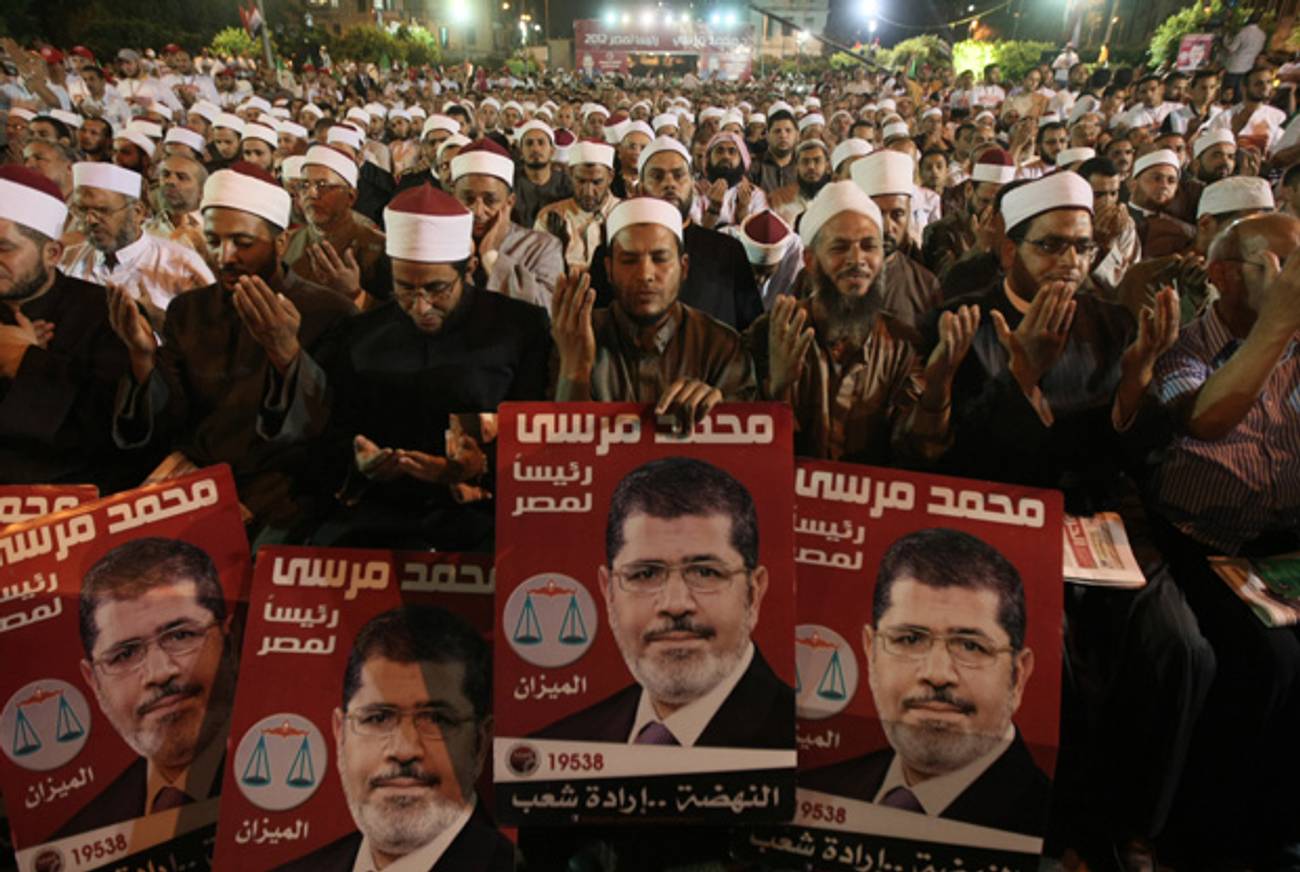An Egyptian Democrat Gives Up
The first free presidential election in Egypt begins today. No matter the winner, liberal democracy has lost.




Today, some 50 million of my countrymen will begin voting in what will likely be the first free presidential elections in the history of Egypt. I am someone who has identified as a liberal activist for my entire adult life, so this should be my proudest moment. It isn’t. In fact, I’m strongly considering putting an end to my political activism.
I haven’t come to this decision based on my prediction of the likely outcome of this particular election—though I think it will come down to a race between Mohamed Morsi, the Muslim Brotherhood candidate, and Ahmed Shafiq, Hosni Mubarak’s last prime minister. It was clear to me well before the January 2011 uprising that if Mubarak ever fell, we Egyptians would be faced with two basic choices: Islamist Repression or Repression of Islamism. Nothing else can come out of free and fair elections here—at least for a long time to come.
That’s not because Egyptians are by nature anti-liberal and anti-democratic, but because my country currently lacks the necessary foundations of liberal democracy. First and foremost, Egypt needs liberal leadership that is capable of directly confronting Islamism. This requires a deep understanding of what individual liberty means—its philosophical roots and historical development—in addition to a good deal of moral courage. Unfortunately, this leadership does not exist, and no one seems interested in investing in it. You can find various editions of Mein Kampf and the Protocols of the Elders of Zion in any modest sidewalk bookstand, but you won’t find John Locke’s Second Treatise on Government or Plato’s Republic in Cairo’s biggest bookstores. (And if you do, it will be either in English or an unreadable Arabic translation.) Meantime, Islamist teaching is ubiquitous in schools and mosques, on bumper-stickers and YouTube videos.
Thus voters are left to decide between the Muslim Brotherhood and old Mubarak hands—there’s no liberal democrat in sight.
Few people in the West—including close friends and political allies—have fully acknowledged this abject dichotomy that we Egyptians face, despite much evidence to the contrary. Instead, these natural allies of Egyptian liberals are celebrating this election as a triumph of liberal democracy, at best, and at worst, as a necessary step toward that triumph.
Why it so difficult for them to come to terms with our reality? Let’s take it group by group.
There are those on the left who look at what’s happening in Egypt through the lens of cultural relativism and post-colonial theory. Muslims are entitled, so goes their argument, to institute their own government according to their own rules, which Westerners can neither understand nor judge. For them, chopping off the hand of a person convicted of theft, then immersing the amputated limb in boiling oil to seal the wound, has absolutely nothing to do with the Eighth Amendment since it is outside their cultural jurisdiction.
Then there are the economic liberals who admit Islamism is bad but believe that Islamists will moderate as they undertake the responsibilities of government and feel the pressure of practical, particularly economic, constraints. As New York Times columnist Thomas Friedman put it in a column reflecting on this year’s parliamentary elections, Islamists “want to be true to their Islamic roots, yet they know their supporters elected them to deliver clean government, education and jobs, not mosques.”
This position reflects a deep ignorance of Islamism, and a deep faith in Homo Economicus: the idea that men live by bread alone. Islamism, however, is not Marxism. It promises happiness despite economic hardship. So, what reason is there to believe that it will moderate, even if the unemployment rate remains upwards of 12 percent?
Then there are isolationists, who don’t care what happens in Egypt—or anywhere else, for that matter—so long as Western governments maintain a clear technological, economic, and military advantage over everyone else. Some of these isolationists are Western supremacists who take this advantage for granted, smiling dismissively when some suggest that the Egyptians could pull off a functioning totalitarian regime that threatens the world as Nazism or Communism did. In the Egyptian case, this doctrine is also known as “Israel can defend itself”—in other words, Israel can always bomb Egypt, so who cares who rules over the 80 million people who live there?
Neocons have a much more complicated story. They believe that Islamism is on the rise in places like Egypt because unfree societies are breeding grounds for radicalism. President George W. Bush’s freedom agenda posited that if these undemocratic political systems liberalized over time, then Egyptians (and Iraqis and Syrians, for that matter) would turn away from the kind of violent radicalism that caused 9/11. All this is the reason they’ve had such a weakness for the Arab Spring, even as it turned to winter.
This thinking is the result of mistaking Jihadism for Islamism. Contemporary Jihadism may have emerged as a result of regime repression in places like Saudi Arabia and Egypt, but Islamism is a far greater historical tsunami.
Islamism will not die out in the face of free voting or economic liberalism or Twitter. It is one of the most formidable ideologies in history, the success of which does not depend on electoral bribes or the ignorance of the average voter. Rather, it stands on thousands of books containing the wisdom of one of the greatest civilizations in history. It comprises serious ideas and ideals that, although they might be diametrically opposed to those of the West, are no less compelling. Most important, Islamism runs on millions of dedicated adherents who are willing to endure imprisonment, exile, unspeakable torture, and even death to uphold what they deem right.
So, what can be done? First, liberals in Egypt and the West need to face up to the poverty of political options for true liberals, even at the risk of becoming depressed about the reality. Second, we should resign ourselves to the fact that for quite some time to come we will have to deal with the least bad of two bad options. Third, we should invest in the creation of a classical liberal movement that could take years to bear fruit. This means building think tanks, translating the founding texts of Western liberalism into accessible Arabic, and providing opportunities at Western institutions to the few young Egyptians who share these values to learn the skills necessary to spread the word.
***
Like this article? Sign up for our Daily Digest to get Tablet Magazine’s new content in your inbox each morning.
Amr Bargisi is the Albert Einstein Fellow at the Einstein Forum in Potsdam, Germany, and a senior partner in the Egyptian Union of Liberal Youth.
Amr Bargisi is the Albert Einstein Fellow at the Einstein Forum in Potsdam, Germany, and a senior partner in the Egyptian Union of Liberal Youth.